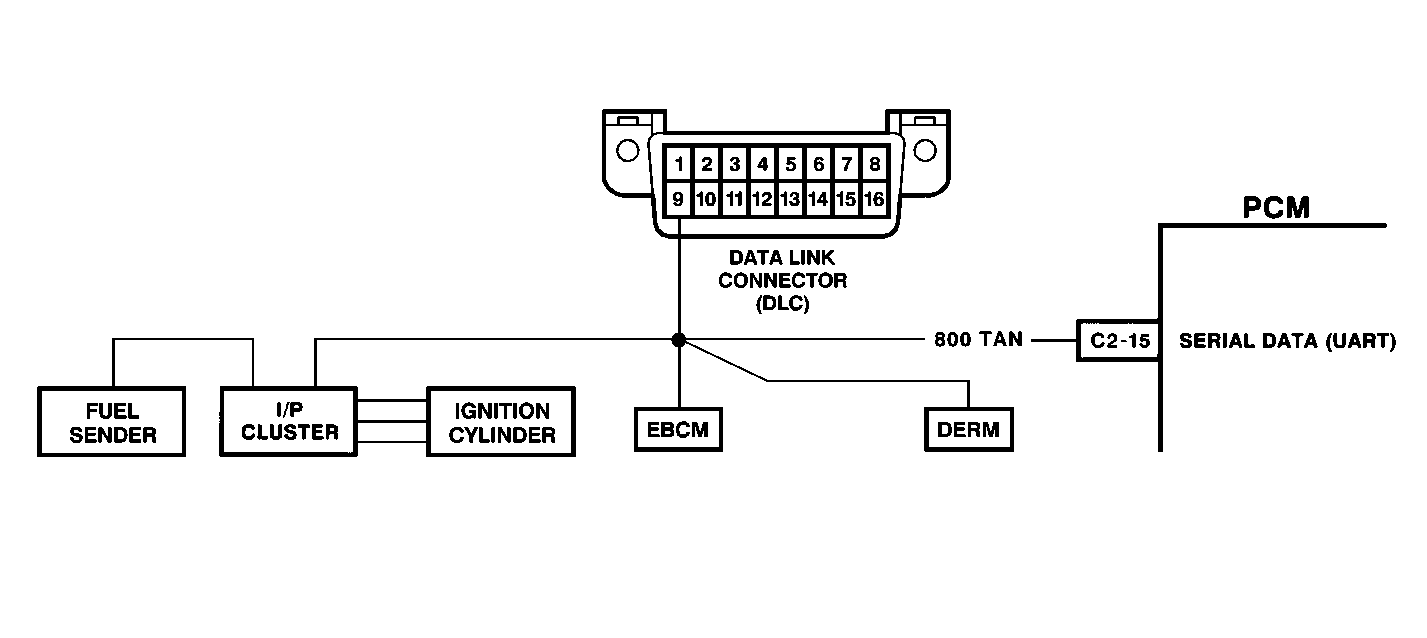
Circuit Description
The PCM uses a fuel level input from the Instrument Panel Cluster (IPC) to determine if the fuel level is too high or too low to be able to accurately detect EVAP system failures. Fuel level is used to calculate expected vapor pressures within the fuel system. These pressures vary as fuel level changes, so their importance is critical to determining if the Evaporative Emissions System is operating properly. If a DTC P0460 is set along with an EVAP System DTC, the EVAP DTC can not be considered valid until DTC P0460 is repaired and cleared.
Conditions for Setting the DTC
| • | Fuel level hasn't changed more than 1.6% in 120 miles. |
or
| • | A DTC P1601 is set and vehicle has been driven more than 120 miles. |
Action Taken When the DTC Sets
| • | The PCM will record the operating conditions during the time which the diagnostic fails. This information will store in the Failure Records buffer. |
| • | A history DTC stores. |
| • | The PCM fuel level value on the scan tool will default to 40 percent. |
Conditions for Clearing the MIL/DTC
| • | The MIL will turn OFF after three consecutive ignition cycles in which the diagnostic runs without a fault. |
| • | A history DTC will clear after 40 consecutive warm-up cycles without a fault. |
| • | The MIL/DTCs can be cleared by using the scan tool. |
Diagnostic Aids
If a DTC P0460 is set along with an EVAP System DTC, the EVAP DTC can not be considered valid until DTC P0460 is repaired and cleared. A DTC P1601 set along with a DTC P0460, indicates that the PCM was unable to obtain updated fuel level information due to a serial data communication problem with the IPC. DTC P1601 must be diagnosed before DTC P0460 as the only problem may have been the serial communication problem and the vehicle was driven more than 120 miles before it was brought in for service.
Test Description
Number(s) below refer to the step number(s) on the Diagnostic Table.
-
The Powertrain OBD System Check prompts the technician to complete some basic checks and store the freeze frame and failure records data on the scan tool if applicable. This creates an electronic copy of the data taken when the fault occurred. The information is then stored on the scan tool for later reference.
-
DTC P1601 must be diagnosed before DTC P0460 as the only problem may have been the serial communication problem and the vehicle was driven more than 120 miles before it was brought in for service.
-
The fuel level sensor and IPC are diagnosed in Section 8C-1 of the service manual.
-
Repair verification is an important step in any diagnostic procedure. Comparing the fuel level readings before and after the repairs is a good way to determine if a repair has been successful.
Step | Action | Value(s) | Yes | No |
|---|---|---|---|---|
Was the Powertrain On-Board Diagnostic (OBD) System Check performed? | -- | Go to | ||
Was a DTC P01601 also set? | -- | Go to | ||
Refer to Section 8C-1 . Is the action complete? | -- | -- | ||
Verify the repairs by viewing the scan tool fuel level data. Does the fuel level data reflect the correct amount of fuel in the tank? | -- | |||
5 |
Does the scan tool indicate that this diagnostic has ran and passed? | -- | ||
6 | Check if any additional DTC's are set. Are any DTC's displayed that have not been diagnosed? | -- | Go to applicable DTC table | System OK |
